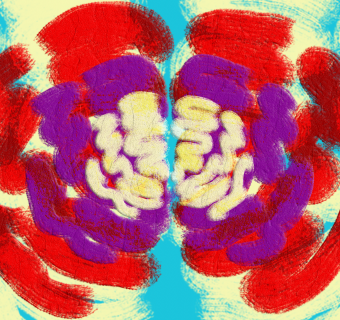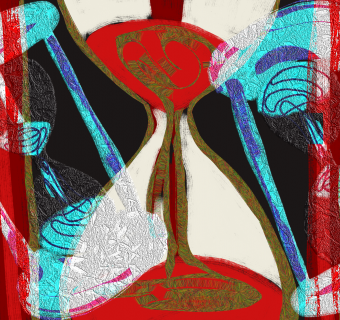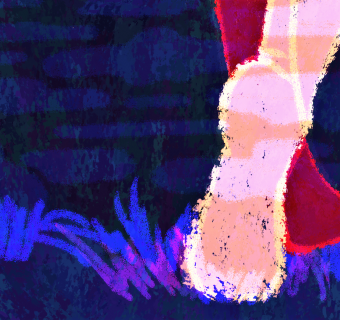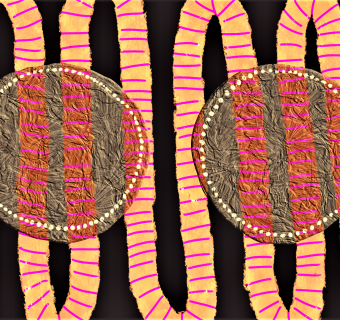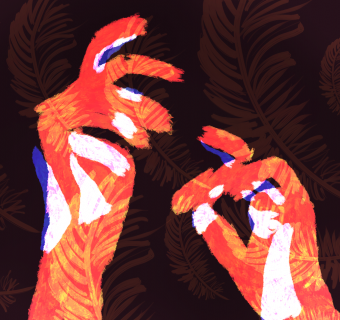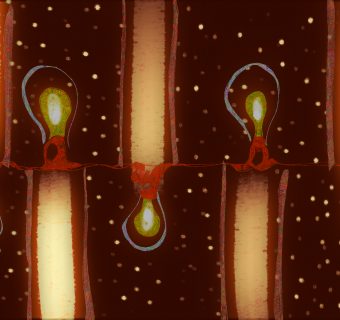When I was in first grade, I wished for the first time to be a writer. I pictured holding a book and running my finger over my name in embossed text on the cover of a pristine book jacket. As I got older, I began to feel uncertain. How do you know whether or not being a creative is even for you? How do you carve out a space for yourself as a writer and avoid feeling like an imposter in a world full of talented and creative people?
Wondering if other prospective authors carried the same weight of these questions, I sat down with two students in UVA’s creative writing department to understand what draws them to the craft and who they are as writers.
Let’s start with introductions! Tell me a little bit about yourself and what you wanted to be growing up?
Lauralee Weinland (she/her): My name is Lauralee, I am a third year English major with a concentration in poetry writing. You know, I actually called my mom and asked her this morning [if she could remember what I wanted to be when I was little], because I couldn't remember. She couldn't remember either. So I don't think I ever really dreamed about labor…. I think I just wanted to be a princess or a doctor. But because I wanted to live the doctor lifestyle, not so much because I actually wanted to be a doctor.
Sydney Sallinger (she/her): I am Sydney Sallinger. I am a third year at UVA and I am a double major in Media Studies [and English]. I'm hoping to concentrate in film for Media Studies and in English I’m in the Area Program in Literary Prose. As for what I wanted to be when I grew up, it was a weekly revolution of things. But I kind of settled into wanting to be an author fairly early. I had an assignment in third grade where we had to write a fake letter to a fake friend. [When] I started writing it, I realized, “Hey, this is kind of fun.”
Can you tell me more about how or when you decided or realized that you wanted to pursue writing as a career?
Sydney: I kind of jumped in and out of wanting [to be a writer] for a while because the first thing that people say when you're a kid and you want to be a writer, is “So what's your backup plan?” For a while, writing was sort of my backup plan, just a hobby. Then I hit sophomore year in high school, and I realized that this was genuinely what I wanted to do with my life. I had been writing recreationally for a while, and I started handwriting books. I fell in love with [the art of writing] all over again. That was when I solidified in my brain that I was going to get a book published at some point in my life, and I would like to do that for the rest of my life.
Lauralee: Actually, it was my first year ENWR, I had this really great professor Michelle [Gottschlich], who took an interest in my writing in particular and encouraged me to continue with it. I came into UVA as a politics major, but that ended up not really fulfilling my passion as much as my creative writing classes did. So I ended up following those courses. Now I'm here.
And I feel like I should say, for the record, that we had the same ENWR professor and she's really awesome. We gushed about her all the time; she was just so magnetic. Can you speak a bit more about what else drew you to writing?
Lauralee: I don't think I've ever not written. I look back through my childhood diaries, and it's filled with just the most melodramatic [entries]. Everything that I thought in a day, I would just have to write down to process and feel it through. I'm driven by [emotion]. Also there’s the drive to just tell my story, I think everyone has a story. I love when I read something that I can relate to a lot, it makes me feel so valid. So I try to do that for other people as much as I can.
In my opinion, every writer is influenced by the stories and people who came before us. Who would you say is your biggest inspiration or influence as a writer?
Lauralee: Honestly, a lot of the UVA graduates and creative writing-sphere people [inspire me] like Lisa Spaar, she's incredible. Brian Teare is fantastic. Rita Dove, obviously. People like
Michelle Gottschlich. Hannah Loeb—I had her as a TA and she was also fantastic. People that I can talk to and get to know on a little more personal level tend to inspire me more than people like Emily Dickinson, who's fantastic and awesome, but I can't ever probe her brain about her work.
Sydney: This is so cheeseball of me. But in the last couple years my dad has really become a big inspiration to my writing, because he's the reason I read so much as a kid. He's the reason I read so much as an adult. He's an English teacher.
I remember my first year at UVA coming home for winter break, sitting in the car, with my dad and confiding, “I don't know what I want to do.” He told me, “Sydney, I don't know why you wouldn't just keep trying to write and trying to be creative,” which is why I'm now in Media Studies and looking at film. In the last two or three years he has really buckled down in support of me writing as a career. It's been really, really cool to have somebody actually in my corner saying, “There is no backup plan. This is the plan.”
Your “plan” involves studying creative writing here at UVA. How has being in the APLP/APPW program affected or changed the way you approach your craft?
Lauralee: I applied on a whim because I didn't think I was going to get in. I had taken an intro class and I thought, “Okay, I'll just do it. We'll see.” When I got in, I realized that…meant that [my poetry] was good and that I should probably continue. Now I find myself surrounded by a lot of really talented writers and artists all the time, which is really great for the [writing] process, because they always say the most groundbreaking things that inspire me. So I leave all of my APPW classes with a million ideas because everyone is so good.
Sydney: I think all the professors are wonderful. I think all of the people I’ve interacted with in the program so far are wonderful. I have a very interesting perspective on APLP because I’m not an academic-minded person. They’re so anti-genre fiction in academic settings. There is this idea of writing needing to be “literary,” and to me, that’s stupid, because the act of writing is literary. The fact that there’s a genre that is titled “Literary Fiction” is really ridiculous to me, and that’s what I’m supposed to be writing in the Area Program in Literary Prose. I think APLP is great, but the way that we think about and the way we talk about writing is really dismissive.
Being in APPW/APLP, you must read a lot of others’ writing. Is there any one work of literature that you’ve found to be particularly meaningful or impactful, either to yourself as a person or as a writer?
Lauralee: I would probably say Mrs Dalloway, Virginia Woolf, which is such an English major answer. But, I always loved the way that she took something so mundane and a very uninteresting day, and made it into this beautiful, 250 page story that you could read over and over again and always find something new.
Sydney: The book that has had the greatest impact on me is The Book Thief. I read The Book Thief by Markus Zusak with my dad, out loud, sitting on the floor of my bedroom when I was 10 or 11, which is a really young age to be reading such an intense book. I think reading aloud gives a different experience because as much as we have switched to a written tradition, I do think [the] oral tradition is still a core part of who we are as human beings. I think there's a lot of value in reading aloud and listening to things being read to you. Experiencing it with another person versus experiencing it alone. That's why The Book Thief had such a heavy impact on me.
Being surrounded by amazing writers and works of literature in APPW/APLP, do you ever have feelings of doubt or imposter syndrome about being a writer? How do you deal with these feelings?
Lauralee: Oh, all the time! I think it's kind of part of the writing process. I feel like everybody has those days where you read a Rita Dove poem, and you think, “how am I ever going to be that good?” Or you encounter something that's so beautiful and insane [and think to yourself], “How do you recreate that? How do I do that? Will I ever be that good?” But I think it's important to recognize that everyone has their own unique writing styles, and you just [have to] write about what makes you tick.
Sydney: Do you know how to avoid feeling like an imposter? I still feel like an imposter in my writing all the time. Dealing with writer's block, doubts, and imposter syndrome, I think, is a part of being a writer. As for dealing with them, I deal with them very poorly. I usually stop [writing], which is not healthy for somebody who wants to do this as a career. I think talking to other people and getting other people to read my writing is a way to keep myself motivated.
While we all feel like imposters at least some of the time, can you tell me about a time, maybe the first time, when you were really proud of something that you wrote?
Sydney: I don't know. I think I'm proudest whenever I finish a project. I think it may have sucked and it might have been one of the worst things I've ever done, but finishing that first draft of a novel for the first time. It was amazing. It was incredible. There's no feeling like looking at something and going, this isn't finished, but it's finished. This is all it can be. Now time to move on to the next thing. I think those are the moments that I'm proud of.
Lauralee: For my English 3001 class, we had our first assignment that was really long and really daunting. I chose the creative option, which was to recreate Beowulf. It had to be 2000 lines or something crazy and you had to do it in the Beowulf alliterative, accentual style. So I spent three days just doing that during fall break, cooped up my apartment, and I grinded it out. After I turned it in, I reread it and I thought, “Oh, this is really good.” I kind of don't remember doing it because I was in a rush to get it done. I sent it to my poetry professor who the assignment wasn't for, and she told me, “This is unironically, the best poem I've read all year.” And I thought, I guess it's good.
So it seems like writing for you, Lauralee, is a really engrossing experience. Can you tell me about your headspace or how writing makes you feel?
Lauralee: I think translating my emotions onto a page is a very validating experience in itself, being able to name what I'm feeling and put it on paper and have to share it with people in a way that makes sense. And hopefully they can relate to it. I don't know, it's just a drive that kind of comes from reading great literature or reading great poetry and then wanting to do that myself, because of the way it made me feel. You know, the Emily Dickinson quote about the top of your head being blown off by poetry, and that's how you know it's a poem. That's what I want to make people feel. And that's also how I feel.
Given that it can often be an isolating, engrossing practice, could you tell me a bit about any communities you have found through writing?
Lauralee: I didn't know anyone going [into APPW]…. I feel like at UVA, it's easy once you get into your third or fourth year to kind of separate into your group. If you're involved in Greek life like I am, you kind of separate off into that and quit interacting with other people. So that's been really nice to expand into a universe where people are as passionate about this thing as I am.
Sydney: I always say that the stereotype of writers and some of those portrayals of famous writers, ironically like J.D. Salinger, are some of the worst portrayals of writers because I don't think you can write anything worthwhile unless you are constantly interacting with other people and seeing how the world changes and evolves around you.
I'd recommend taking classes. Or if you're trying to just write recreationally, I would 100% recommend fanfiction, which might be an out-there suggestion for a lot of people, but is a great way to build a writer's community. Here at UVA, I'm actually a part of a brand new writing club. If anybody wants to join, it's called Hoos Writing. We started to put something together last semester and now we're a CIO. But yeah, classes, clubs, and online.
You’ve listed some ways to get involved in communities for writing, do you have any other advice for people who are just starting out as writers?
Lauralee: Keep writing. It's really hard when you're writing to not judge yourself as you're doing it. There are so many times where I write a line and I think, “Wow, that's terrible.” But it's important not to delete those lines immediately, because they could turn into something so beautiful. Keep trying new things. If it's not good, that's okay. It doesn't have to be. And, you know, if it's not your best work, it doesn't mean that it's not important or valuable.
Sydney: The advice is to just fucking do it. The “fucking” is necessary there. It's so important to actually write. Some people will tell you that thinking about writing counts as writing—it doesn't. The act of writing is important. Anybody that is interested in writing should just do it. You don't need to be a Pulitzer Prize winning novelist to be a writer. The second you start putting words to a page, you are a writer and you are an author. Advice I see all the time is to keep a journal. Words on a page are always valuable, even if it's just for you.
Finally, I’m always looking for new book recommendations, and who better to get a recommendation from than a creative writing student! So what should I read next?
Lauralee: Yes, I'm currently reading Her Body and Other Parties by Carmen Maria Machado. She is just the most brilliant, beautiful writer, ever. She also has a book called In the Dream House, which is about a queer abusive relationship and it's told in like half poetry-half prose vignettes. They're beautiful. I mean, they're devastating, but she is stunning. She’s an on-the-rise writer and I would recommend for everyone to read her work.
Sydney: I think anything by Khaled Hosseini is fantastic. He did The Kite Runner, A Thousand Splendid Suns, and other stuff. But those are the two that I've read and they are fantastic—super impactful. I recommend The Book Thief to absolutely everybody. If you're looking for a short story collection, for class last year, I chose to read Interpreter of Maladies by Jhumpa Lahiri, and it was fantastic. [It’s a] beautiful analysis on love and loss and connection. [Also,] Perks of Being a Wallflower—one of the best books I think ever written. I could go on for hours but I'm gonna stop there.



